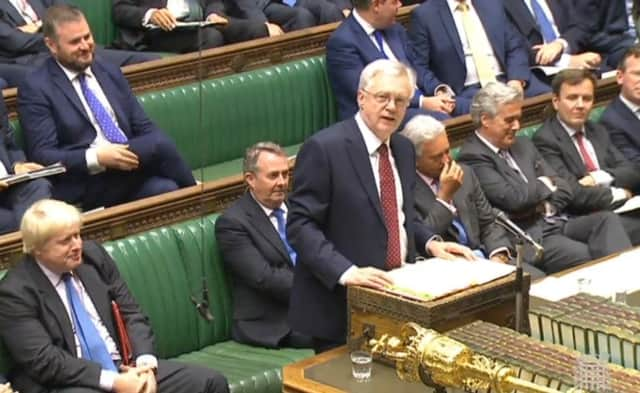Leaders: Rhetoric over substance defines Brexit speech


If politics is the art of promising to build a bridge even where there is no river, David Davis yesterday demonstrated that his powers of fabrication are being put to good use in the continuing farce that has come to define Britain’s protracted disentanglement from the European Union.
In what represented a masterclass in the age-old political skill of employing rhetoric in the place of substance, the Brexit secretary had few answers for a country still unsure of its place in the world more than ten weeks on from the historic EU referendum.
Advertisement
Hide AdAdvertisement
Hide AdHis address to the House of Commons was rich in aspirational language, referring to “the best deal for Britain,” whereby the country would grasp “the huge and exciting opportunities that will flow from a new place for Britain in the world”.He added: “There will be new freedoms, new opportunities, new horizons for this great country.”
His statement came across as a more moderate argument for the leave campaign, one that might have been welcome a few months back, given the ill-tempered debate that preceded the referendum.
But the votes have been cast and the argument settled. Mr Davis’s responsibility now is to to provide answers of how the process of Brexit will work in practice and what Britain hopes to get out of it. Anyone listening to him yesterday will be none the wiser.
“Naturally, people want to know what Brexit will mean,” he said at one point.” “Simply, it means leaving the European Union.” That much is evident. It is time for Mr Davis to step up and explain not the simple version of events, but the complex one.
He reiterated that Brexit meant Britain would reassert its autonomy of its borders and its laws. Beyond that, there was no detail of how that will work in practice.
Mr Davis deflected questions concerning the single market question and said that Brexit meant “controls on the numbers of people who come to Britain from Europe, but also a positive outcome for those who wish to trade in goods and services.” In short, the strategy seems to be to have our cake and eat it.
As things stand, we must look abroad in order to find concrete responses to Brexit. Europe is not only making its feelings known, but is offering detailed analysis of what can go right and wrong.
By contrast, a Brexit department that now has more than 180 staff in London plus “expertise” from more than 120 officials in Brussels has come up with precious little in the way of proposals. Instead, Mr Davis speaks of building a “national consensus.” Given unanimity has so far eluded the Conservative government, let alone the country at large, it seems a woolly and insufficient response.
Advertisement
Hide AdAdvertisement
Hide AdPredictably, the vagueness of Mr Davis’s speech invited stern criticism from across the political spectrum, with shadow Brexit secretary Emily Thornberry calling for a parliamentary vote on triggering Article 50.
All that is certain is that a slow and pained process has some considerable way to run.
Homelessness a persistent scourge
If our authorities are sincere in their ambition to make this country a more equal place, they must redouble its efforts to end the scourge of homelessness.
Statistics released earlier this summer showed that the number of people in Scotland assessed as homeless or under threat of becoming homeless went down by 5 per cent. The direction of travel is welcome, but its pace is unacceptably slow.
That is why Shelter Scotland’s strongly worded criticism of national and local government’s response to this scandal is entirely justifiable. The charity has said the fact nearly 30,000 households across the country became homeless last year is a “national badge of shame.”
There will be many Scots who regard homelessness as a problem that afflicts others, but with escalating house prices and rental costs, increasing numbers of working families find themselves living on the breadline. All it takes is a slight change in their circumstances the safety and security their home provides can be removed. Shelter points out that more than 65,000 households approached local authorities for help.
At a national level, homelessness can and must be seen as a terrible symptom of more deep-rooted problems. At the heart of all of them is the ever widening gap between Scotland’s rich and poor.
The Scottish Government has said it is doing “everything it can” to make sure everyone has access to a warm and safe place to stay, but with such ignomonious statistics as presented by Shelter, it is clear that more should be done. It is time for a strategy that will embrace bold new ideas and solutions to a persistent problem.